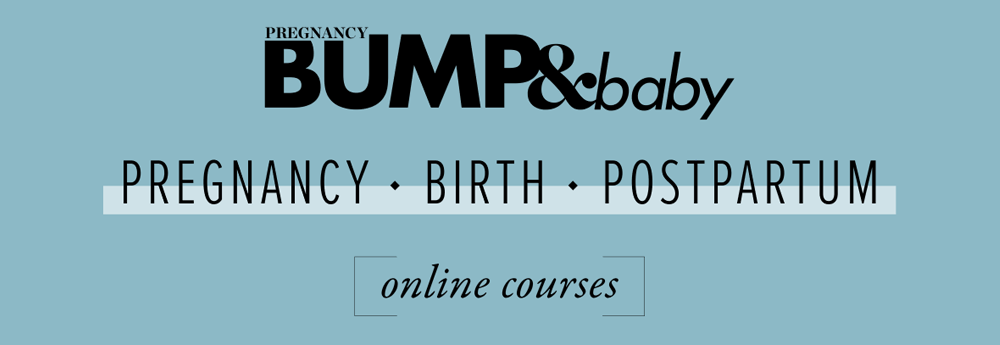
By now you may be feeling impatient for pregnancy to be over, but there’s still a bit more time needed for your baby to grow and develop. Your baby is moving around a lot, and making you uncomfortable at times from pokes, jabs, and kicks – sometimes it may feel like he or she is using your bladder as a trampoline! Your body is still undergoing changes, and you might be experiencing occasional dizziness or faintness this month. Getting up too quickly can cause your blood pressure to drop quickly and make you feel light-headed. Also, when your blood sugar dips – a common issue for pregnant mums – it can trigger a dizzy spell. Keep snacks on hand for quick relief, and if you are worried about any of your symptoms or you notice side effects that happen often, make sure to talk to your LMC or midwife. Continue to take your pregnancy supplements and to eat well. It’s around this time that your baby will also start shedding the lanugo hair that covers his or her body, which will be mostly gone by birth.
Those are not grapes
We’re sorry, but haemorrhoids (also called piles) are common during pregnancy, even if you’ve never suffered from them before. Pressure from your enlarging uterus coupled with increased blood flow to your pelvic area can cause the veins in your rectum to swell and bulge out of your anus, itching and burning when they are irritated. They can sometimes bleed, particularly when you are on the toilet or having a bowel movement. The good news is that they usually go away after your baby is born. But until then, try these tips:
- Avoid sitting or standing for a long time.
- Practise your pelvic floor exercises.
- Prop your feet up on a stool while you have a bowel movement.
- Eat fibre-rich foods to avoid constipation.
- Sit in a warm bath to reduce discomfort.
- Talk to your LMC or pharmacist before trying home remedies or medications, as some aren’t suitable for pregnant women.
Belly bothers
As your baby grows, your belly button will have started stretching out and possibly even protruding, and by now it might feel like it’s stretched to the max. You might also have itchy belly skin as your tummy continues to grow and stretch to accommodate your baby. Because your skin is stretching quite rapidly and over a relatively short period of time, it becomes moisture-deprived, and starts to itch. Moisturiser and body oil may help. Give yourself (or enlist your partner’s help to give you) a tummy massage with body oil. If you feel an all-over itch that isn’t related to stretchy skin, or you develop a rash on your tummy or abdomen, check with your midwife.
How big is my baby?
At the beginning of this, your second-to-last month of pregnancy, your baby will weigh about 1.8kg and be 47cm long. At this stage your baby’s growth is a bit slower than in early and mid-pregnancy, but it’s steady, as your baby’s body fills out. By the end of this month, he or she will weigh around 2.5kg and be about 48.5cm long. Things are getting cramped inside your uterus, as your baby does quite a lot of practising the skills he or she needs to survive outside of the womb – breathing, kicking, swallowing, and even sucking. If you have another ultrasound scan, you may even see your baby sucking his or her thumb!
Baby brain
Are you finding yourself forgetting things like where you put your car keys, or are you putting the milk in the cupboard and the cereal in the fridge? Many pregnant mums talk about “preggy brain”, but the jury is out on whether this condition really exists. Some research asserts that a woman’s brain cell volume does decrease during pregnancy. Others think that heightened forgetfulness is simply a result of hormonal changes. Still others point to sleep deprivation as the source of mummy brain fade. And it’s possible that you aren’t really any more absent-minded than usual, but because people always talk about preggy brain, you think you’ve got it. Whatever the reason, it’ll lift following the birth of your baby, and you’ll soon feel like your brain is working at full capacity again.
Wee, wee, wee all the way home
As your baby moves head-down and into the position in which he or she will be born, your uterus is placing more pressure than usual on organs below it – like your bladder.
- Drink at least eight glasses of water a day – restricting your water intake because you think it will make you go to the loo more often can backfire and cause dehydration and urinary infections.
- Do pelvic floor exercises to help prevent and correct incontinence.
- Empty your bladder as completely as possible each time you wee.
- Avoid constipation, as straining to have a bowel movement can put pressure on your pelvic floor muscles, weakening them.
INSIDE INFO
Please be sure to exit your seat safely – mind the bump!
QUICK FACTS
WEEK 32: Your baby is the size of a bunch of grapes (1.8kg, 47cm) and can suck his or her thumb.
WEEK 33: Your baby is the size of a pineapple (2kg, 47.5cm) and is developing his or her immune system.
WEEK 34: Your baby is the size of a rock melon (2.2kg, 48cm), and if male, his testicles are descending into his scrotum.
WEEK 35: Your baby is the size of a box of tissues (2.5kg, 48.5cm) and is settling into a head-down position.
WHOOPING COUGH VACCINE BOOSTER
Whooping cough is particularly tough on infants and young children – six out of 10 infected are admitted to hospital, with one of these six ending up in intensive care. A whooping cough vaccine booster for pregnant mums passes protection to their unborn baby and protects mum. This helps bridge the gap until baby’s first immunisations are completed at five months of age. The vaccine is free for mums between 28 and 38 weeks of every pregnancy. The ideal timing is before 36 weeks, as your immune system needs time to respond to the vaccine and pass that protection on before your baby is born.
BUMP&baby
BUMP & baby is New Zealand’s only magazine for pregnancy and early babyhood. Our team of mums and mums-to-be understand what it’s like to be pregnant in this connected age, and that’s why BUMP & Baby online is geared toward what pregnant women and new mums really want to know.
Other articles of interest
Month 3 (weeks 9-13)
You’ll notice visible changes in your body this month, because your baby is reaching some significant developmental…







